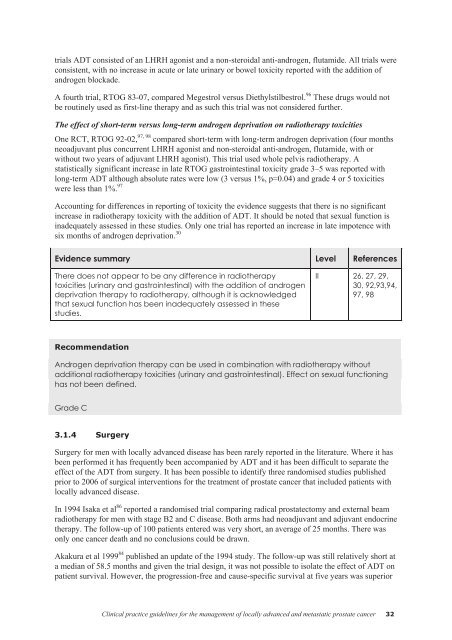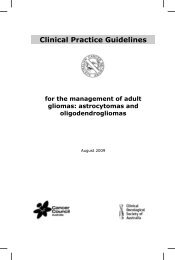Clinical Practice Guidelines for the management of locally advanced ...
Clinical Practice Guidelines for the management of locally advanced ...
Clinical Practice Guidelines for the management of locally advanced ...
You also want an ePaper? Increase the reach of your titles
YUMPU automatically turns print PDFs into web optimized ePapers that Google loves.
trials ADT consisted <strong>of</strong> an LHRH agonist and a non-steroidal anti-androgen, flutamide. All trials were<br />
consistent, with no increase in acute or late urinary or bowel toxicity reported with <strong>the</strong> addition <strong>of</strong><br />
androgen blockade.<br />
A fourth trial, RTOG 83-07, compared Megestrol versus Diethylstilbestrol. 96 These drugs would not<br />
be routinely used as first-line <strong>the</strong>rapy and as such this trial was not considered fur<strong>the</strong>r.<br />
The effect <strong>of</strong> short-term versus long-term androgen deprivation on radio<strong>the</strong>rapy toxicities<br />
One RCT, RTOG 92-02, 97, 98 compared short-term with long-term androgen deprivation (four months<br />
neoadjuvant plus concurrent LHRH agonist and non-steroidal anti-androgen, flutamide, with or<br />
without two years <strong>of</strong> adjuvant LHRH agonist). This trial used whole pelvis radio<strong>the</strong>rapy. A<br />
statistically significant increase in late RTOG gastrointestinal toxicity grade 3–5 was reported with<br />
long-term ADT although absolute rates were low (3 versus 1%, p=0.04) and grade 4 or 5 toxicities<br />
were less than 1%. 97<br />
Accounting <strong>for</strong> differences in reporting <strong>of</strong> toxicity <strong>the</strong> evidence suggests that <strong>the</strong>re is no significant<br />
increase in radio<strong>the</strong>rapy toxicity with <strong>the</strong> addition <strong>of</strong> ADT. It should be noted that sexual function is<br />
inadequately assessed in <strong>the</strong>se studies. Only one trial has reported an increase in late impotence with<br />
six months <strong>of</strong> androgen deprivation. 30<br />
Evidence summary Level References<br />
There does not appear to be any difference in radio<strong>the</strong>rapy<br />
toxicities (urinary and gastrointestinal) with <strong>the</strong> addition <strong>of</strong> androgen<br />
deprivation <strong>the</strong>rapy to radio<strong>the</strong>rapy, although it is acknowledged<br />
that sexual function has been inadequately assessed in <strong>the</strong>se<br />
studies.<br />
Recommendation<br />
II 26, 27, 29,<br />
30, 92,93,94,<br />
97, 98<br />
Androgen deprivation <strong>the</strong>rapy can be used in combination with radio<strong>the</strong>rapy without<br />
additional radio<strong>the</strong>rapy toxicities (urinary and gastrointestinal). Effect on sexual functioning<br />
has not been defined.<br />
Grade C<br />
3.1.4 Surgery<br />
Surgery <strong>for</strong> men with <strong>locally</strong> <strong>advanced</strong> disease has been rarely reported in <strong>the</strong> literature. Where it has<br />
been per<strong>for</strong>med it has frequently been accompanied by ADT and it has been difficult to separate <strong>the</strong><br />
effect <strong>of</strong> <strong>the</strong> ADT from surgery. It has been possible to identify three randomised studies published<br />
prior to 2006 <strong>of</strong> surgical interventions <strong>for</strong> <strong>the</strong> treatment <strong>of</strong> prostate cancer that included patients with<br />
<strong>locally</strong> <strong>advanced</strong> disease.<br />
In 1994 Isaka et al 86 reported a randomised trial comparing radical prostatectomy and external beam<br />
radio<strong>the</strong>rapy <strong>for</strong> men with stage B2 and C disease. Both arms had neoadjuvant and adjuvant endocrine<br />
<strong>the</strong>rapy. The follow-up <strong>of</strong> 100 patients entered was very short, an average <strong>of</strong> 25 months. There was<br />
only one cancer death and no conclusions could be drawn.<br />
Akakura et al 1999 84 published an update <strong>of</strong> <strong>the</strong> 1994 study. The follow-up was still relatively short at<br />
a median <strong>of</strong> 58.5 months and given <strong>the</strong> trial design, it was not possible to isolate <strong>the</strong> effect <strong>of</strong> ADT on<br />
patient survival. However, <strong>the</strong> progression-free and cause-specific survival at five years was superior<br />
<strong>Clinical</strong> practice guidelines <strong>for</strong> <strong>the</strong> <strong>management</strong> <strong>of</strong> <strong>locally</strong> <strong>advanced</strong> and metastatic prostate cancer<br />
32



